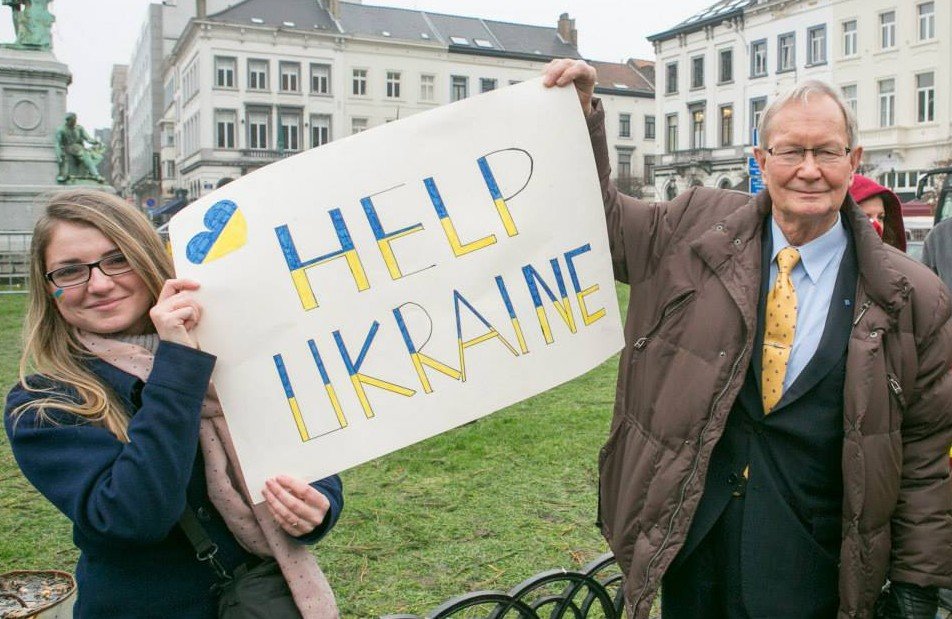Estonian Member of European Parliament, Tunne Kelam, made a statement on Saturday, saying that Russia’s aggression against Ukraine “is a chilling reminder of Hitler’s step-by-step destruction of Czechoslovakia”, calling for the suspension of both Russia’s membership in the Council of Europe and also the negotiations about future visa-free movement between the EU and Russia.
Tunne Kelam’s statement in full:
Just one week after the Sochi Olympics, President Putin has made clear the real nature of the current Russian regime. We are dealing with a big power whose policy is exercising its own interests at expense of the sovereignty of its neighbors and systematically violating international law.
Modern sports have been viewed as a substitute for war under conditions allowing fair and honest competition without the use of weapons. However, just a few days after the closing ceremonies of the Sochi Olympics, President Putin returned to the distant past.
His aggression against Ukraine is a chilling reminder of Hitler’s step by step destruction of Czechoslovakia, using the pretext of protecting the ethnic German minority living there. Hitler succeeded thanks to the appeasement policy of the democratic West.
After the disintegration of the Soviet Union, the Kremlin has applied a similar strategy not only in Ukraine, but also in different variations toward most nations formerly under Soviet domination.
Western powers have indirectly enabled this brutal policy by ignoring Russian official doctrine under which the Kremlin claims the right to intervene by force in the internal affairs of its neighboring states to “protect” the safety of Russian compatriots living there.
The criteria for their safety are unilaterally defined by the Kremlin according to Russia’s current political goals.
In practice this means that a nuclear power is putting itself above commitments to which it has agreed, usurping unilaterally the position of highest arbiter of international law.
Since the EU and NATO have not paid serious attention to Russia’s numerous military maneuvers which have even enacted the invasion by Russian military forces into the territory of its neighbors, President Putin became convinced that he has more and more leeway.
The West’s lame reaction to the 2008 incursion into Georgia has paved the way for a much larger aggression against Ukraine’s sovereignty and territorial integrity.
It is essential to recall that it was the Russian Federation together with the USA and Great Britain that in 1994, in return for Ukraine relinquishing its nuclear weapons, guaranteed Ukraine’s existing borders and committed itself to refrain from all forms of economic coercion against Kiev.
In fact, using military force to counter Ukraine’s European orientation and against its territorial integrity poses a risk to the security of all East European states.
Further developments will depend upon the clarity and forcefulness of the reaction of the European Union and NATO.
One conclusion is clear – their relations with the current Russian regime cannot continue within the framework of “business as usual”. Russia has placed itself outside the G8 club. The planned G8 summit in Sochi under the Russian presidency should be cancelled.
Russia has violated practically all commitments to the Council of Europe to which it agreed at its accession. Russia’s membership in the Council of Europe should be frozen. Negotiations about future visa free movement between Russia and the EU should be suspended. Officials up to the highest level who are responsible for aggression should be denied visas and their bank accounts in the West blocked. Only in this way can Moscow’s aggressive policies be restrained. Otherwise the aggression will not stop with Crimea and Ukraine, but will continue.
Russia is not all-powerful. It is fragile socially and politically, its economy is dependent on the export of raw materials and thus vulnerable. The efficiency of the bulk of its armed forces is questionable. Real and well-coordinated pressure by democratic states will bring results provided there is political will and responsibility in avoiding a new appeasement. The future of Europe will be decided in Ukraine.
I
Cover photo: Tunne Kelam (left) taking part in the meeting in support of democratic Ukraine in Brussels/Courtesy of Tunne Kelam.
The opinions in this article are those of the author.

